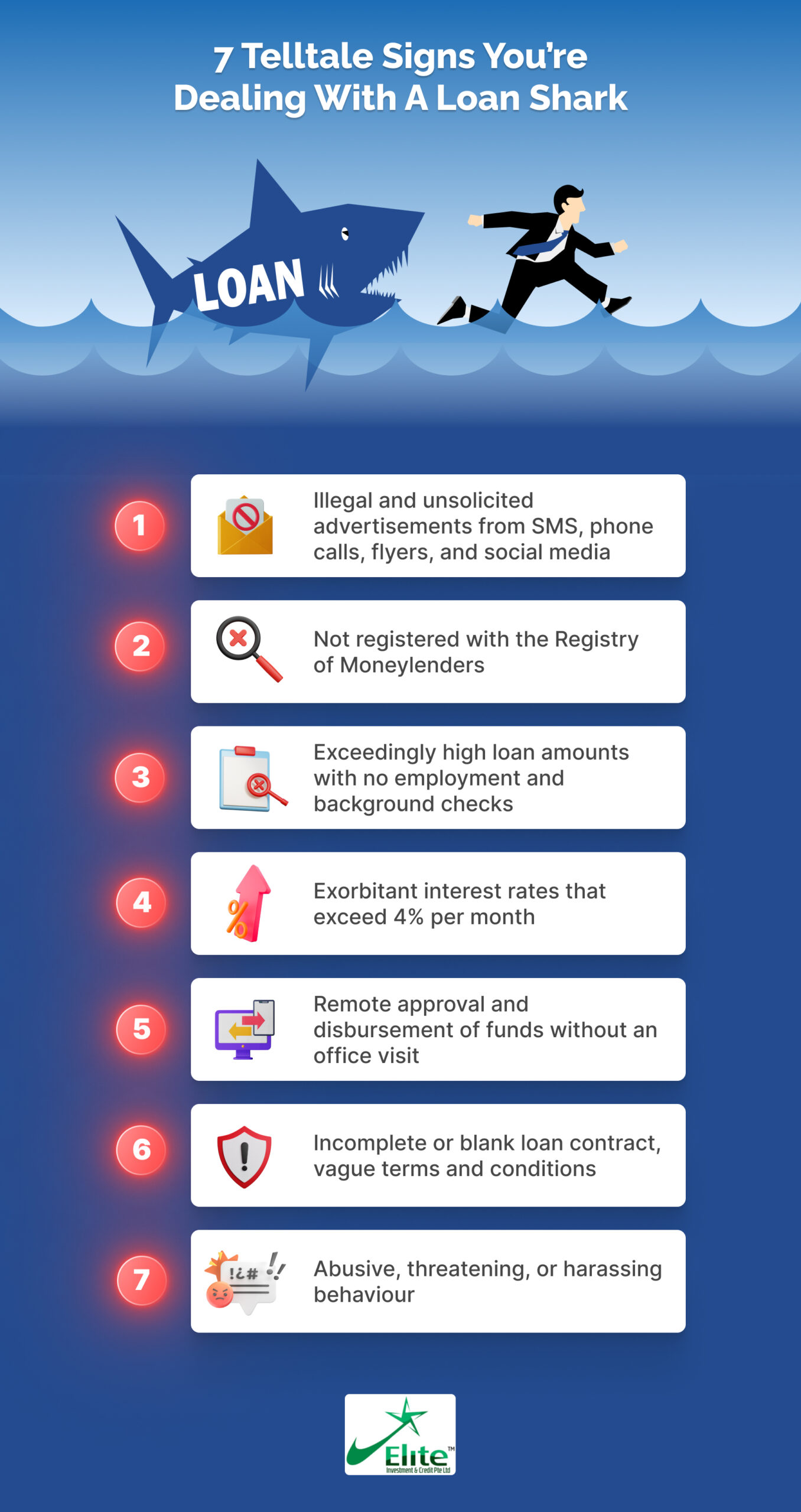While Singapore is a generally safe city and the crime rate is low, that doesn’t mean you should let your guard down. Illegal money lenders like loan sharks do exist despite the introduction of the Moneylenders Act Singapore in 2008. To this day, loan shark harassment cases in Singapore regularly make the news.
On the other hand, there’s also the possibility of licensed money lender harassment occurring especially when borrowers default on loan payments. However, this should never be the case as a legal money lender in Singapore must follow the rules and regulations by MinLaw, or they risk losing their moneylending licence.
So, now that you’re aware of licensed money lender harassment and loan shark harassment in Singapore — learn what the telltale signs are and how to avoid these situations as much as possible.
What are loan sharks?
Just like the predatory creatures they are named after, loan sharks are illegal money lenders in Singapore that prey on the vulnerable.
They lure their victims with the promise of an easy loan and charge exorbitant interest and unreasonable charges on it.
When borrowers inevitably fail to pay up, there’s a high chance of loan shark harassment occurring, which usually includes intimidation and violence against borrowers.
Often, these harassment activities are brought upon the borrower’s place of residence, causing innocent family members and neighbours to be dragged in as well.
Warning signs you are dealing with a loan shark
Illegal lenders should be avoided at all costs, lest you fall victim to loan shark harassment in Singapore.
Here are some warning signs of loan sharks to take note of.
Illegal and unsolicited advertisements
If you receive a loan offer via SMS, WhatsApp, email, flyers, and/or social media, chances are they are coming from illegitimate lenders.
Licensed lenders are only allowed to advertise using three platforms: business or consumer directories (both print or online media); on their websites; or advertisements displayed at their own offices.
Not registered with the Registry of Moneylenders
All money lenders need to have a proper licence to carry out business activities.
Licensed lenders are registered with the Registry of Moneylenders (ROM), which is the regulatory body overseeing the money lending sector in Singapore.
Loan sharks are unlicensed money lenders, and thus, would not be found in the official list of authorised lenders, marking them as unlawful parties you should stay away from.
Exceedingly high loan amounts
Loan sharks will offer large loans without question to leverage your need for money. They will do so without making any checks on your credit history or asking for proof of your employment status or salary slips.
Under the Moneylending Act of Singapore, licensed lenders are required to screen borrowers for eligibility before offering loans. Also, how much an individual can borrow is determined by income level, as follows:
| Annual income | Maximum loan amount |
| S$20,000 and above | 6x monthly income |
| Between S$10,000 and S$20,000 | S$3,000 |
| Less than S$10,000 | S$3,000 (Citizen or PR) or S$500 (Foreigner) |
Any lender that promises you an exceedingly high amount is highly likely to be engaged in fishy business.
Exorbitant interest rates
Licensed lenders are required to cap their interest charges and fees at limits specified by ROM.
Take note that the maximum interest allowed is 4% per month, and late fees should not exceed S$60 for each month the payment is late. Admin fees are also capped at 10% of the loan amount. The combined total of interest charges and fees cannot exceed 100% of the original loan amount. You can read about these limits in detail here in our guide to the Moneylenders Act of Singapore.
Loan sharks, on the other hand, will not adhere to these interest rate caps with some charging as much as 20% per month as seen in a police advisory highlighting a 2017 case. They are also known to change interest rates on a whim to inflate your loan to sky-high levels. That’s not all. They may also charge admin or processing fees more than 10% using “express service” as an excuse.
Disburses funds remotely
An important step when taking a loan from a licensed lender is paying a visit to the lender’s office to verify their money lender’s licence, have them check your documents and go over the loan in detail. This must be accomplished before the lender is allowed to release the funds to you.
On the other hand, loan sharks will offer to deposit the funds in your bank account remotely, under the guise of convenience. Do not be fooled; this is most likely because they do not want to maintain a registered business address that can tie them to their illegal activities.
Blank or missing loan contract
To protect both borrowers and lenders, licensed lenders are required to provide a Note of Contract that spells out critical information regarding the loan, such as:
- Loan amount
- Interest rate
- Loan tenure and repayment schedule (weekly, fortnightly, or monthly)
- Fees and charges
- All other relevant terms and conditions
As you’d expect, loan sharks or unlicensed money lenders will not provide a loan contract, or will only offer an incomplete one, containing vague terms, or even completely blank, which they will then fill in as they see fit.
Abusive, threatening, and violent behaviour
Loan sharks can and will start acting aggressively and abusively toward you once they have you in their grasp. They will harass you and threaten violence against you and your family to get you to continue to pay them more and more money.
Licensed lenders are held to professional standards of behaviour, and will not resort to abuse, threats, or harassment. They will also be willing to renegotiate your loan if you’re facing difficulty in repaying your debt.
What is licensed money lender harassment?
When you start to wonder: ‘is a money lender threatening me?’ — it speaks volumes of your subconscious negative feelings towards a lender’s behaviour, which ultimately is a response to how you’re dismayed by the way your money lender is treating you.
Licensed lenders have to stay professional at all times when speaking to borrowers and collecting debts from them. It is mandatory for lenders to adhere to the guidelines established in the Moneylenders Act at all times.
In the event that they don’t and behave unlawfully or demonstrate acts of violence — it means you’re experiencing harassment from a money lender. Learn what the different signs of licensed money lender harassment are below to ensure you’re able to avoid it at all costs.
Make threats, intimidate or harass you
Singapore’s Protection From Harassment Act (POHA) states that nobody should use any forms of threats, abusive language, or violence against anyone. This also applies to publishing information about your identity, name calling for being unable to repay a debt, or being cyberbullied online by a lender.
All these are considered acts of harassment from money lenders, and are punishable by law. Additionally, the law doesn’t only apply to a borrower, but also extends to your friends and family.
Commit vandalism
If you’re thinking: ‘My property is being vandalised by a debt collector, does this mean a money lender is threatening me?’
First things first, a licensed lender that writes “O$P$” outside your house is undoubtedly committing an offence. In accordance with the Vandalism Act, a licensed lender or debt collector is not permitted to deface your property or write profanities on public spaces.
This law extends to pasting notices, hangers or flyers about your debt collection around your home or workplace. It is considered a form of money lender harassment and committing this offence can result in a $1,000 fine.
Unlawful stalking
Under the Protection From Harassment Act (POHA), any debt collector or licensed lender that monitors or follows your movements is committing an act of unlawful stalking. The various forms of unlawful stalking include:
- Constantly following you or your loved one intentionally
- Appearing at places you often frequent even when you’re not present
- Always trying to be near you wherever you go
- Monitoring and tracking your whereabouts
- Persistently trying to communicate with you or your loved ones through any means
- Interfering with your property or that of your loved one’s
- Sending you items or intentionally leaving them where you can locate them
Cause injury
Nobody is allowed to inflict injury or affect your physical integrity. Causing injury is considered a serious offence in Singapore. The respective offences and punishments are as follows:
- Any sort of physical harm that leads to your unconsciousness may result in an offender facing a jail-sentence of up to 2 years, be charged a fine of $5,000, or both.
- Any form of grievous injury that leads to dislocations, fractures, or disfigurement may result in an offender facing a jail-sentence of up to 10 years, caned, or fined.
Execute unlawful assembly
Licensed lenders or debt collectors that arrange a group of at least five people to appear in front of your home to intimidate you is considered an unlawful assembly. This form of licensed money lender harassment is also known as a mob, and is an illegal form of act that can lead to jail term.
Even if it’s only a group of three or four people, it’s still a form of intimidation and harassment by money lenders hence is punishable according to the Protection From Harassment Act (POHA).
What to do if you’re facing money lender or loan shark harassment
If you or someone you know is facing harassment or unsavoury antics from loan sharks or money lenders, follow these tips.
Report the money lender or loan shark to the police
The first thing you should do is to make a police report to seek protection and assistance.
You can call 999 or dial the X-Ah Long hotline at 1800 924 5664 to report money lender or loan shark harassment in Singapore, or if you suspect anyone is involved in such activities.
Stop making payments and cut all contact
You should also immediately cease paying any more money to the money lender or loan shark, whether you have paid up your loan or not.
This is because unlicensed lenders and loan sharks are not authorised to conduct moneylending activities, and hence, have no legal right to collect on any debt you owe.
You should also cut off all contact with and ignore their phone calls, text messages, or other attempts to contact you. You might be putting yourself in harm’s way and you should avoid them at all costs or report them right away.
Make it a point to ignore all unsolicited contact and marketing messages from money lenders. If you’re facing harassment from a money lender, or if you encounter any of such communication, do lodge a complaint to ROM at 1800 2255 529.
Make an application under the Protection from Harassment Act
If the identity of the loan shark or money lender is known to you, you can also apply for a Protection Order under the Protection from Harassment Act (POHA), which criminalises stalking and harassing behaviour.
Furthermore, POHA also gives victims the option to sue their harasser for compensation.
However, this is easier said than done. Loan sharks are well aware of their illegal status, and will be careful not to divulge their identity. On the flip side, it may be easier to report a money lender as their identity is usually known online as they would have to be registered under the list of licensed lenders by MinLaw.
Get help from the Credit Collection Association of Singapore (Only applies to money lenders)
CCAS can step in to mediate the situation between you and a licensed lender. You can seek assistance in settling your debt with the lender, such as negotiating a new repayment plan to ease the burden of repayments.
However, this is provided that the legal lender or debt collecting agency is a member of CCAS — otherwise, they can’t help with the situation.
And if you’ve borrowed from a loan shark, you will not be able to get their assistance as well.
Conclusion: Be extra vigilant when borrowing money
Loan shark and money lender harassment do happen to borrowers, and it could very well happen to you if you’re not careful. Even if you’re ever in a dire financial situation, never resort to borrowing from loan sharks; they charge exorbitant interest rates and may cause harm to you or your loved ones if you can’t repay the debt.
Licensed lenders are always the safer choice, as they’re regulated under the Moneylenders Act. However, this doesn’t mean that licensed money lender harassment won’t happen for sure — there is still the possibility if the money lender is insistent on collecting a debt through any means, even illegal ones. Blacklisted money lenders do exist and will appear in a separate list right below the list of licensed lenders by MinLaw.
Elite Investment & Credit does not condone any form of threat, violence, or harassment. We’re a licensed lender that upholds the rules of the law and values our customers’ financial well-being. Most importantly, we treat our borrowers with utmost respect.
We’re a Geylang money lender that provides a variety of loans, such as renovation loans, business loans, payday loans, debt consolidation loans, bad credit loans, and many more. Contact us today if you’re looking to enquire about one of our loans. On the other hand, if you’re all ready to take up a loan — apply for a loan with us in just a matter of minutes. Regardless of your financial situation, we’re always ready to help.
About the Author

Jasbir Kaur
No fuss, No stress. You can count on me to get the facts right.


